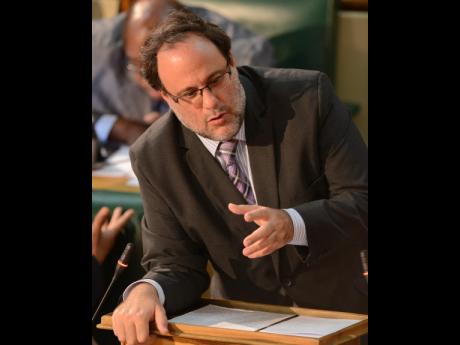Guilty plea discount
Persons who have been sentenced to serve minimum mandatory sentences by the court will soon be able to apply to a judge to review their punishment should they feel it is unjust and excessive.
The provision for sentence review is contained in the Criminal Justice (Administration) (Amendment) Bill which was passed in the Senate with 11 amendments yesterday.
The bill makes provision for sentence reduction on guilty pleas, and makes it possible for persons to get up to a 50 per cent discount.
Justice Minister Mark Golding said that the facility to allow persons to appeal sentences that have been imposed is a kind of safety valve.
?We had argued for it back in 2010 and we are introducing it now. Where the particular mandatory minimum sentence and the facts before the court would be manifestly excessive and unjust, that would enable a review to take place,? Golding said.
matter for trial judge
Opposition Senator Marlene Malahoo Forte said that the review scheme, which involves a person seeking leave to go to the Court of Appeal to appeal his sentence, would be unnecessary bureaucracy and should be a matter for the trial judge. She said the trial judge is best placed to handle these matters.
?At this time, I really do not believe that we should be legislating to layer or add more burden in the courts in the way we are doing. The real problem with the mandatory minimum is whether it does justice in the circumstances of a case,? she said.
Malahoo Forte, in a sotto voce comment, said it was all or nothing for her as she felt strongly about the clause and voted against it. It was supported by all other senators present including opposition senators Alexander Williams and Arthur Williams.
The Criminal Justice (Administration) Act, which was tabled in the Senate yesterday by Golding, states that where a defendant indicates to the court, on the first relevant date, that he wishes to plead guilty to an offence, the sentence may be reduced by up to 50 per cent.
The first relevant date refers to the first date on which the defendant, who is represented by an attorney-at-law, or who elects not to be represented by a lawyer, is brought before the court after the judge or resident magistrate is satisfied that the prosecution has made adequate disclosure to the defendant of the case against him, in respect of the charge for which the defendant is before the court.
Where the defendant indicates to the court after the first relevant date, but before the start of the trial, that he wishes to plead guilty, the sentence may be reduced by up to 35 per cent.
A 15 per cent discount has been proposed in instances where the guilty plea has been entered once the trial has commenced but before the verdict is given.

